Book Review – The Reality of the Dream: My unique journey from non-league to the Premier League by Malcolm Christie
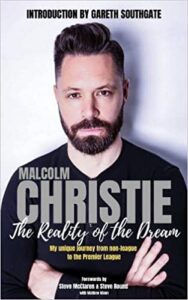 At the back of Malcolm Christie’s biography titled The Reality of the Dream, is a table showing his appearances and goals from his youth and amateur career and his time in the semi-professional and professional game. Putting aside Christie’s scoring record as an amateur and youth player, what stands out is that as a professional from 1998 to 2009 – some 11 years – he only managed 132 starts and 51 appearances from the bench. Now it could be interpreted that at his three clubs, Derby County, Middlesbrough and Leeds United, the management team simply didn’t ‘fancy’ Christie and so his first team opportunities were limited. However, the reality is that his career was decimated by a series of debilitating injuries which meant Christie was more familiar with the treatment room than the dressing room and therefore unsurprisingly features large in this autobiography.
At the back of Malcolm Christie’s biography titled The Reality of the Dream, is a table showing his appearances and goals from his youth and amateur career and his time in the semi-professional and professional game. Putting aside Christie’s scoring record as an amateur and youth player, what stands out is that as a professional from 1998 to 2009 – some 11 years – he only managed 132 starts and 51 appearances from the bench. Now it could be interpreted that at his three clubs, Derby County, Middlesbrough and Leeds United, the management team simply didn’t ‘fancy’ Christie and so his first team opportunities were limited. However, the reality is that his career was decimated by a series of debilitating injuries which meant Christie was more familiar with the treatment room than the dressing room and therefore unsurprisingly features large in this autobiography.
The book opens with two Forewords, one from Steve Round and the other from Steve McClaren who worked as assistant and manager, respectively, during Christie’s spells at Derby County and Middlesbrough. It also includes an Introduction from current England manager, Gareth Southgate, who was Middlesbrough skipper and then manager during Christie’s time at the Riverside Stadium. All as you would expect praising Christie’s character during his difficult playing career.
As readers we first hear Christie’s ‘voice’ in the Prologue, which details his goal at Old Trafford on May 2001 as Derby beat the Premier League Champions elect, a result which would see the Rams eventually hold onto their top-flight status. It is undoubtedly the highlight of Christie’s career, with him scoring against the club he supported since boyhood and its importance in Derby’s fight to avoid the drop, providing it with immense significance.
The story then opens with the first of 24 chapters as it goes back to Christie’s childhood, and his playing days at school, detailing how he came to support Manchester United, despite growing up in Lincolnshire. Although rejected by Peterborough United early on, Christie found his way into the professional game after a successful spell at non-league Nuneaton Borough, scoring 14 goals in 21 games. Jim Smith was the Derby County manager in 1998 and he signed the 19 year old Christie, who at the time besides his part-time football was working in Somerfield’s supermarket. Having not come through an Academy meant that Christie (as he admits in the book) wasn’t grounded and groomed in the same way as other young professionals and so wasn’t confident in this new environment and indeed his first experience as a substitute warming up at Anfield in the Premier League was an eye-opener for the teenage Christie.
1998/99 though saw Christie make his Premier League debut with two substitute appearances, first against Sheffield Wednesday on 30 January 1999 and then on 20 March 1999 against Leeds United. In the following season, 1999/2000, Derby started badly and by December had only three wins from seventeen games and were in one of the relegation spots. Christie too was struggling on a personal level after receiving a misguided Secret Santa gift from a fellow player, “I became even more self-conscious and retreated further into my shell…I spent too much energy trying to be the person I thought people wanted me to be, instead of being my normal self. As a result, my teammates never got to know the real me.” Nonetheless, on 15 January 2000, Christie made his first start for the Rams and scored twice as they beat Middlesbrough on their own patch 4-1. It saw him finish the campaign with six goals from ten starts as well as eleven appearances off the bench and earning him the Club’s Young Player of the Year award. This brought Christie to the attention of Howard Wilkinson who was then the England U21 manager, who had guided his team to the European Championships in the summer of 2000. Having flown out to Slovakia, Christie was not included in the final squad so returned to the UK. He then contracted viral meningitis and as would sadly happen on other occasions in later years, found his fitness hit by illness and injury.
 Thankfully in this case, Christie’s absence from the first-time wasn’t a long one and he returned to duty in early September 2000 with Derby once again getting off to a poor start in their league campaign. However, it proved to be a memorable one as Christie finished as Derby’s league goals top scorer with 12, the Rams retained their Premier League status, and he scored his first England for the England U21s. However, what topped it off for Christie was becoming a sticker in the Panini Premier League album! It illustrates how much of a fan he was and retained a schoolboy enthusiasm even as a top-flight professional.
Thankfully in this case, Christie’s absence from the first-time wasn’t a long one and he returned to duty in early September 2000 with Derby once again getting off to a poor start in their league campaign. However, it proved to be a memorable one as Christie finished as Derby’s league goals top scorer with 12, the Rams retained their Premier League status, and he scored his first England for the England U21s. However, what topped it off for Christie was becoming a sticker in the Panini Premier League album! It illustrates how much of a fan he was and retained a schoolboy enthusiasm even as a top-flight professional.
However, after dodging the bullet of relegation in two previous seasons and despite the addition of Fabrizio Ravanelli the club was relegated at the end of the 2001/02 campaign. Christie stayed at the Pride Park for the start of the following season but departed for then Premier league Middlesbrough on deadline day in January 2003 in a joint deal with Chris Riggott who was to have a significant impact on Christie’s career. At that time, Boro’ were a decent side under Steve McClaren with the like of Gareth Southgate, Croatian striker Alan Boksic and Brazilian superstar Juninho in the squad.
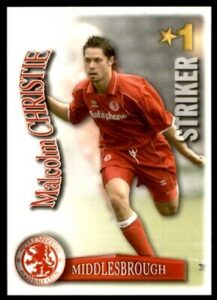 Whilst things on the pitch were good for Christie as he scored in his first start, he reflects that it was a period when his mental health was suffering to the extent that, “my anxiety levels had been increasing at an alarming rate since the 2002 Euros and by the time I joined Middlesbrough, I was no longer able to suppress it and I began to suffer with bouts of double vision.” Indeed, Christie is open throughout the book on his struggles acknowledging that stress wasn’t viewed by sport and indeed society back then as a real issue, which thankfully today is being addressed.
Whilst things on the pitch were good for Christie as he scored in his first start, he reflects that it was a period when his mental health was suffering to the extent that, “my anxiety levels had been increasing at an alarming rate since the 2002 Euros and by the time I joined Middlesbrough, I was no longer able to suppress it and I began to suffer with bouts of double vision.” Indeed, Christie is open throughout the book on his struggles acknowledging that stress wasn’t viewed by sport and indeed society back then as a real issue, which thankfully today is being addressed.
With the 2002/03 season at an end, Christie underwent surgery for a groin injury and removal of his tonsils which impacted his pre-season preparation. However, battling the physical tiredness and on-going mental issues, he started the season, scoring the winner in extra-time against Brighton in the League, a goal that would set Boro’ on their way to Wembley. For Christie though what happened next was to change things irrevocably.
“I will never forget the 4th November 2003. It was the day my life changed forever. It was the day my football career ended. It’s as simple as that.”
In a routine training session, Christie had his leg broken in a tackle with Chris Riggott who had joined Middlesbrough with Christie. Christie attached no blame then or in the book for what happened. He wasn’t out of plaster until February 2004 so was not part of the Boro’ squad which went on to win the League Cup. Christie like the other injured players were kept away from the squad on the day and it deeply hurt him. “Whilst the Boro’ players were celebrating in the dressing room…myself and the other cast-offs…were boarding a coach back to the airport, again missing out on a once in a lifetime opportunity.” His feelings were that strong that he did not attend a celebration dinner and had to be persuaded by manager Steve McClaren to be part of the bus-top parade to show off the trophy.
With the dawn of the new season and Middlesbrough in the UEFA Cup, Christie was still struggling with is leg despite playing for the reserves and a sub appearance in Europe against Banik Ostrava. Eventually he had a CT scan which revealed his leg was still effectively broken and so required surgery. Christie pulls no punching in being critical of the treatment he received and the impact it had on his physical and mental health. He returned to action 15 months later in February 2005, scoring on his return at Portsmouth only to be injured in his next match with a stress fracture of the fifth metatarsal, which required surgery.
2005/06 saw Middlesbrough back in the UEFA Cup and Christie back in pre-season training. However, once again the footballing gods were not on his side as operations were needed to deal with the rod in his leg which was causing knee problems and nerve problems in his feet. Even after coming through these and returning to training, injury struck again with a re-fractured foot. Whilst he sat on the side-lines, Boro’ reached the FA Cup Semi-Final and UEFA Cup Final, the most successful period of their history. By April 2006 Christie was back in action, and unlike the League Cup previously travelled as part of the squad to the UEFA Cup Final in Eindhoven.
The following season Steve McClaren left the Riverside Stadium to become England manager with Gareth Southgate coming in as Boro’ gaffer. Once again Christie suffered another injury, this time, torn ankle ligaments. Returning in November 2006 he scored against Aston Villa, a first goal in 21 months. In a stop start season, Christie started his final match for Boro’ in April 2007 playing a full ninety minutes for the first time in three and a half years. With his contract expiring in June 2007 his time on Teesside was over. As with some much of this book, Christie is honest about his mindset at the time, “leaving was the right thing for me and the club, I needed to get away from football for a bit…part of me had given up and I’d begun to fall out of love with the beautiful game.”
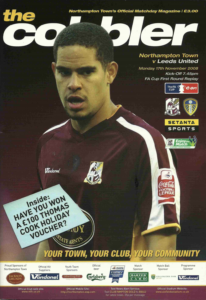 Without a club, Christie went on trial at Hull City in what provided to be another demoralising experience with him suffering some poor treatment by then Tigers manager Phil Brown. Burton Albion offered a contract which Christie turned down and was then given a lifeline trialling at Leeds United in January 2008. However, unbelievably in training Christie suffered a fractured spine which meant that he didn’t play a single game in 2007/08. In November 2008 he signed for Leeds and debuted against Northampton Town in the FA Cup. With Leeds manager Gary McAllister keen to sign Christie, he was then sacked and replaced by Simon Grayson. With his back problems persisting the final straw for Christie came in late January 2009 when after not being picked for a game against Peterborough United and an overhead outburst from Grayson, Christie walked away from football. Christie reflects on the moment saying, “my overriding emotion was one of pure relief. My injury problems had started way back in November 2003 and had dragged on through to January 2009…over five years of injury hell.”
Without a club, Christie went on trial at Hull City in what provided to be another demoralising experience with him suffering some poor treatment by then Tigers manager Phil Brown. Burton Albion offered a contract which Christie turned down and was then given a lifeline trialling at Leeds United in January 2008. However, unbelievably in training Christie suffered a fractured spine which meant that he didn’t play a single game in 2007/08. In November 2008 he signed for Leeds and debuted against Northampton Town in the FA Cup. With Leeds manager Gary McAllister keen to sign Christie, he was then sacked and replaced by Simon Grayson. With his back problems persisting the final straw for Christie came in late January 2009 when after not being picked for a game against Peterborough United and an overhead outburst from Grayson, Christie walked away from football. Christie reflects on the moment saying, “my overriding emotion was one of pure relief. My injury problems had started way back in November 2003 and had dragged on through to January 2009…over five years of injury hell.”
The final chapter explores Christie’s life after his playing career, which saw him work in the motor industry until 2019 and find a more settled family life, reconnecting with his parents once more. Christie though rediscovered his love for the game through his boys, leading to him setting up his own Academy, Christie Coaching. As this review is written Christie has taken up a post at former club Middlesbrough as a Youth Development Phase Coach and one can hope that he translates the undoubtedly ability he had as a player to the youngsters under his charge.
The Reality of the Dream is an incredibly honest account. As readers we share the joy of his journey to being a Premier League player and scoring the winner against his boyhood club. However, equally it is not an easy read at times as you feel Christie’s anxiety, pain and torment as his career drifts away from the high of that goal at Old Trafford in May 2001 through the strength sapping injuries to the low of walking away from Elland Road in January 2009. Christie is open about his mental health struggles, and it is hoped that this book has been cathartic and part of the process in his healing process and his re-engagement with the game that he loves.
(Publisher: Morgan Lawrence Publishing Services. June 2022. Paperback: 248 pages)
Buy the book here: Malcolm Christie
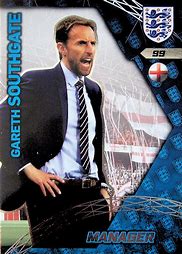 It’s been interesting to hear Gareth Southgate and indeed others in the media talk about this squad being unburdened by history. Indeed I remember writing back in 2018, pondering on the impact of that loss to Croatia at the World Cup would have on that squad. Just three years later of the 26 man squad England playing at the Euros, just nine players (a little over a third) were part of that defeat and are Jordan Pickford, Kyle Walker, John Stones, Harry Maguire, Jordan Henderson, Harry Kane, Raheem Sterling, Kieran Trippier and Marcus Rashford. So given that the majority of the squad don’t have that negative experience in their locker and indeed they have seven players aged 22 or under, there is a freedom and fearlessness of youth that has served the Three Lions well during the competition to date.
It’s been interesting to hear Gareth Southgate and indeed others in the media talk about this squad being unburdened by history. Indeed I remember writing back in 2018, pondering on the impact of that loss to Croatia at the World Cup would have on that squad. Just three years later of the 26 man squad England playing at the Euros, just nine players (a little over a third) were part of that defeat and are Jordan Pickford, Kyle Walker, John Stones, Harry Maguire, Jordan Henderson, Harry Kane, Raheem Sterling, Kieran Trippier and Marcus Rashford. So given that the majority of the squad don’t have that negative experience in their locker and indeed they have seven players aged 22 or under, there is a freedom and fearlessness of youth that has served the Three Lions well during the competition to date.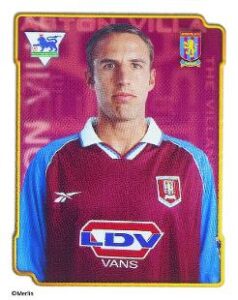 At every opportunity the media have rolled out the 1996 Euro penalty miss by England boss Southgate and talked about redemption for the then Aston Villa defender. He instead has continued to focus on the job in hand, and whilst of course he will still carry those memories from that night at the ‘old’ Wembley, he responds to every media question always with his mind on the present and the objective of winning the European Championship for the first time in England’s history. Whatever happens tomorrow, he and his squad can be proud of what they have achieved. But of course, one more victory would be oh so welcome.
At every opportunity the media have rolled out the 1996 Euro penalty miss by England boss Southgate and talked about redemption for the then Aston Villa defender. He instead has continued to focus on the job in hand, and whilst of course he will still carry those memories from that night at the ‘old’ Wembley, he responds to every media question always with his mind on the present and the objective of winning the European Championship for the first time in England’s history. Whatever happens tomorrow, he and his squad can be proud of what they have achieved. But of course, one more victory would be oh so welcome.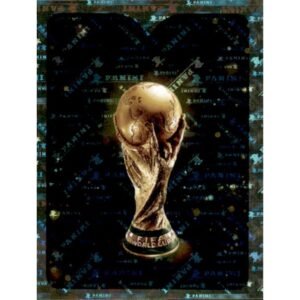 Final Reflections.
Final Reflections.